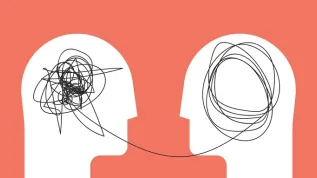
For addictive users of pornographic content, the situation associated with viewing pornography is more stimulating than pornography itself, which is conducive to addiction, according to research of experts from Poland, the Netherlands and the United States.
Researchers led by Dr. Mateusz Gola of the Institute of Psychology of the Polish Academy of Sciences in Warsaw write about it in the latest issue of Neuropsychopharmacology. Their analyses show that people who frequently use pornography do not have no more sex drive than the average person. They differ, however, in terms of brain activity.
"Until now, it has been speculated that addiction users are either more or less sensitive to it than ordinary people" - explained Dr. Gola. "It has been assumed that they need more pornography because they are used to it, or they watch more pornography because it is more stimulating for them. Meanwhile, our research shows that the sensitivity to pornography is the same for both addicted and average users".
A team of psychologists from Poland, the Netherlands and the United States came to the conclusion that for addicted users of sexual content, the situation associated with watching it is more stimulating than pornography itself. For example, they search for pornographic content when they see something they have seen several times before watching pornography, or when they are alone at home or in the office.
"This is a learned context of the use of pornography, which results in an irresistible need to watch it again" - concluded Dr. Gola, initiator of the research project.
Health organizations have yet to see that addictive use of pornography is in many respects reminiscent of gambling addiction, notes co-author Dr. Michał Lew-Starowicz, MD from the Institute of Psychiatry and Neurology in Warsaw.
"The number of scientific studies on this subject is small, and those in need find it difficult to get effective help. We want to change that" - the expert said.
He added that many people suffer because of the loss of control over viewing of erotic pictures and videos. A major difficulty is the easy access to photos and videos on the web.
Referring to the studies conducted in recent years, experts alarm that 75% men and 20% women aged 18 to 30 watch pornography at least once a week. Sexual content is also used by children: 93% boys and 62% girls had contact with it before the age of 18.
It is not known how many people are addicted to pornography. The data presented in the report show that 8% of 15- to 30-year-olds experience a sense of loss of control over the frequency and place of use of pornography. They are more likely to be men than women. Also among those seeking psychological help, there are five times more men than women.
Young people often do not know that watching porn can lead to addiction. Among 18-year-olds, 79% boys and 62% girls think that watching pornography regularly is a typical behaviour. Among the 12-year-olds, 10 percent boys and 11% girls believe that. Children at the age of 10 most often have had the first contact with pornography.
International team of specialists led by Dr. Mateusz Gola wants to develop effective treatments for people addicted to pornography. As a result, in July 2017, they began a new phase of research, for which they are looking for adult men who feel they have lost control over the use of erotic content or other sexual behaviours such as paid sexual services.
Researchers offer free and professional therapy based on the latest research. Those who wish to participate in therapy are asked to complete the survey at: http://rekrutacja.hiperseksualnosc.pl.
Previous research of the team of Dr. Mateusz Gola from the Institute of Psychology of the Polish Academy of Sciences was carried conducted in the years 2014-2016. The team has the support, among others, of gambling addiction experts: Dr. Guillaume Sescousse from Donders Institute in the Netherlands and Marc Potenza from Yale University. Also involved in the project are Dr. Artur Marchewka from the Nencki Institute of Experimental Biology. Marceli PAS and Dr. Scott Makeig of the University of California, San Diego.
Zbigniew Wojtasiński, PAP - Science and Scholarship in Poland
zbw/ zan/ kap/
tr. RL
Fundacja PAP zezwala na bezpłatny przedruk artykułów z Serwisu Nauka w Polsce pod warunkiem mailowego poinformowania nas raz w miesiącu o fakcie korzystania z serwisu oraz podania źródła artykułu. W portalach i serwisach internetowych prosimy o zamieszczenie podlinkowanego adresu: Źródło: naukawpolsce.pl, a w czasopismach adnotacji: Źródło: Serwis Nauka w Polsce - naukawpolsce.pl. Powyższe zezwolenie nie dotyczy: informacji z kategorii "Świat" oraz wszelkich fotografii i materiałów wideo.













